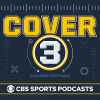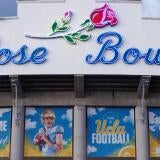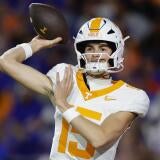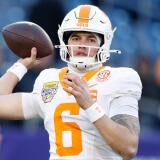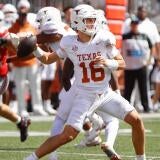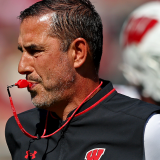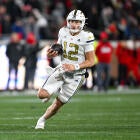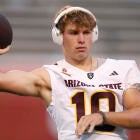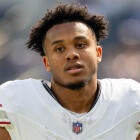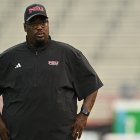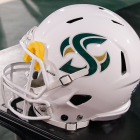College football turns 150: All-Time All-America team features the game's greatest ever
Position-by-position breakdown of the best players in college football history
The task: picking an All-Time All-American team from the first 150 years of college football. Degree of difficulty: all but impossible. Nonetheless, our team of CBS Sports college football writers put pen to paper -- and/or fingers to keyboard -- to get the job done.
The scenario is difficult because it asks: How does one judge players from the time the game started in 1869 -- when there were no training tables, television or even helmets -- to those taking the field today? As season No. 150 opens, the game has reinvented itself at every turn. The forward pass didn't debut until 1906. None of Notre Dame's Four Horsemen weighed more than 162 pounds. Option football evolved into the wishbone, which eventually evolved into the spread.
USC's Ron Yary became one of the most efficient offensive lineman of all time playing at 255 pounds. How do you compare Oklahoma State Heisman Trophy winner Barry Sanders to Illinois' Red Grange, who played a decade before the first Heisman was even awarded? Sanders rushed for an NCAA-record 2,628 yards in 1988. Grange played in the 1920s when his 2,649 career yards in total offense made him the best of his era. Spoiler alert: Sanders made the team. Grange did not.
The CBS Sports All-Time All-American first team stretches back to 1962 (linebacker Dick Butkus' first year at Illinois), though second-team center Chuck Bednarik takes the entire process back to 1945. There are only two players from the 21st century on the first team but a total of 10 overall (out of 54 selections).
Nebraska occupies five of the 27 first-team spots with Heisman winner Johnny Rodgers getting the nod at both punt returner and as an all-purpose player. Cornhuskers quarterback Tommie Frazier was also a first-team pick as still one of only five quarterbacks to win back-to-back national championships since the 1950s.
The only other schools with multiple players on the first team were Alabama (three), Florida State, Michigan and USC (two each). A total of 18 schools are represented on the first team. Ten of those are in top 15 in all-time wins.
Even after 150 years, college football is still a bit of an exclusive club. But that's the beauty of any argument over an all-time team. It's wide open. Let's take a look at how our 54-member All-Time All-America teams break down.
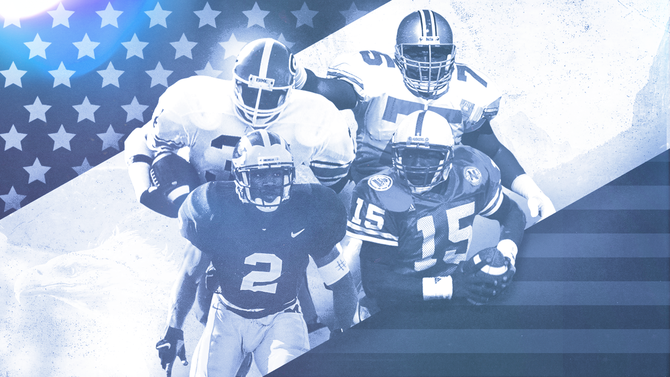
CBS Sports All-Time All-America First Team
* indicates a unanimous selection
Quarterback -- Tommie Frazier (Nebraska, 1992-95): Frazier was best appreciated as time went on. He wasn't the best thrower. He went undrafted after leading Nebraska to consecutive national championships. But his signature play endures -- a 75-yard twisting, turning, tackle-breaking touchdown run against Florida in 1996 Fiesta Bowl.
Running backs -- Herschel Walker (Georgia 1980-82), Barry Sanders (Oklahoma State, 1986-88): Walker was a once-in-a-generation who looked like he could play professionally as a freshman. A three-time All-American, Walker is still the only player to finish in the top three of the Heisman three consecutive years. Sanders was always aloof. He had to be coaxed to a TV interview after winning the Heisman while in Tokyo for a game. But his stop-on-a-dime style may never be surpassed.
Wide receivers -- Randy Moss (Marshall, 1995-97), Anthony Carter (Michigan, 1979-82): Moss endured a rocky start at Florida State and Notre Dame before settling at FCS Marshall. His speed and length were attributes seldom matched. Carter didn't stand 6-foot but became one of the most feared weapons in Big Ten history. At the time of his graduation, he held nearly every Michigan receiving and return record. He's still second in receiving yards as well as kickoff and punt return yards.
Tight end -- Ozzie Newsome (Alabama, 1974-77): Newsome was Bama's player of the decade for the 1970s. While his career catch total was modest (102), his total contribution was noted by Bear Bryant, who called him the greatest tight end in Alabama history.
Center -- Dave Rimington (Nebraska, 1979-82): Rimington was such a dominant player at Nebraska that he has a national award named after him. The Rimington Award honors the nation's best center.
Offensive linemen -- Orlando Pace* (Ohio State, 1994-96), Jonathan Ogden (UCLA, 1992-95), John Hannah (Alabama, 1970-72), Ron Yary (USC, 1965-67): Pace was a road grader whose 320-pound frame was so versatile he played on the defensive line as well. Ogden started at left tackle for four seasons, allowing just two sacks over 23 games in his final two years with the Bruins. Hannah might be one of the most dominant college athletes ever. He threw the shot put and discus and was an undefeated college wrestler. Yary started at a JUCO and played on the USC defensive line before blocking for O.J. Simpson.
Defensive linemen -- Lee Roy Selmon (Oklahoma, 1972-75), Ndomukung Suh (Nebraska, 2005-09), Hugh Green (Pittsburgh, 1977-80), Reggie White (Tennessee, 1980-83): Four forces that were nearly unstoppable during their careers: Suh may be the best defensive lineman in Nebraska history. White and Green were disrupters. "The Minister of Defense" finished with 198 NFL sacks. Green finished second in the 1980 Heisman voting after posting 17 sacks for Pitt. Selmon had to be compared to his brothers Lucious and Dewey at OU. He may have been in the best in the family winning the Outland Trophy, Lombardi Trophy and becoming a consensus All-American his final two seasons.
Linebackers -- Dick Butkus (Illinois, 1962-64), Derrick Thomas (Alabama, 1985-88), Tommy Nobis (Texas, 1963-65): Thomas is among the best of the hybrid linebackers who could line up on the edge and beat any offensive lineman to the quarterback. Butkus and Nobis were old school tacklers. "Every time he hit you, he tried to put you in the cemetery, not the hospital," Deacon Jones once said of Butkus.
Cornerbacks -- Charles Woodson* (Michigan, 1995-97), Deion Sanders (Florida State, 1985-88): The term "shut down corner" was made for these two. Woodson beat out Peyton Manning for the 1997 Heisman more on versatility than numbers. He eliminated the opposition's best receiver, played wideout and returned kicks. Sanders backed up his mouth with his play becoming a two-time consensus All-American with 17 career interceptions and an average of 15 yards per punt return as a senior.
Safeties -- Ed Reed (Miami, 1998-01), Ronnie Lott (USC, 1977-80): Two players who made safety into a leadership position. Lott became a starter as a sophomore during a streak in which USC went 28 games without a loss. Reed was the epitome of leadership that went along with Miami swag. Reed was a unanimous All-America pick in 2001, the year of Miami's last national championship. The nine-time Pro Bowler also returned three punts for touchdowns for the Hurricanes.
Kicker -- Sebastian Janikowski (Florida State, 1997-99): The, um, colorful "Seabass" made almost 80 percent of career field goals at Florida State (76th all time). In his three college seasons, Janikowski led the FBS in field goals made (66 total).
Punter -- Ray Guy (Southern Miss, 1970-72): When you have an award named after you, that's a good place to start. Guy not only routinely unleashed 60 yarders, he kicked a 61-yard field in a snowstorm at Utah State. He also was Southern Miss' starting safety (18 career interceptions) and could reportedly throw a 100 mph fastball. Guy was drafted three times in baseball by Cincinnati, Kansas City and Atlanta.
Kick returner -- Raghib Ismail (Notre Dame, 1988-90): Far better known as "Rocket" for his incredible speed that had him also running track for the Fighting Irish, Ismail was the talk of college football. He may not have won the Heisman many believe he deserved -- and he is still not a member of the College Football Hall of Fame -- but Ismail tortured opposing teams, averaging 27.6 yards on kick returns with five touchdowns. (He also averaged 7.7 yards per rush and 22.0 yards per reception in his career.) "He's faster than the speed of sound," legendary Michigan coach Bo Schembechler once said. "He may be the best I've ever seen. We couldn't tackle him."
Punt returner, all-purpose player -- Johnny Rodgers (Nebraska, 1970-72): Rodgers was perhaps the most versatile player of all time. The 1972 Heisman winner caught 143 career passes, rushed 130 times and returned 98 punts (scoring 44 touchdowns). In his final game, Rodgers accounted for five touchdowns against Notre Dame in the Orange Bowl.
CBS Sports All-Time All-America Second Team
| Offense | | | |
|---|---|---|---|
QB | Tim Tebow | Florida | 2006-09 |
RB | Archie Griffin | Ohio State | 1972-75 |
RB | Bo Jackson | 1982-85 | |
WR | Larry Fitzgerald | Pittsburgh | 2002-03 |
WR | Jerry Rice | Mississippi Valley State | 1981-84 |
TE | Mike Ditka | Pittsburgh | 1958-60 |
C | Chuck Bednarik | Penn | 1945-48 |
OL | Anthony Munoz | USC | 1976-80 |
OL | Bryant McKinnie | Miami | 1997-2001 |
OL | Will Shields | Nebraska | 1989-92 |
OL | Tony Boselli | USC | 1991-94 |
| Defense | | | |
DL | Joe Greene | North Texas State | 1966-68 |
DL | Bubba Smith | 1964-66 | |
DL | Warren Sapp | Miami | 1992-94 |
DL | Rich Glover | Nebraska | 1969-72 |
LB | Mike Singletary | 1977-80 | |
LB | Ray Lewis | Miami | 1993-95 |
LB | LaVar Arrington | 1997-99 | |
CB | Champ Bailey | Georgia | 1996-98 |
CB | Rod Woodson | 1983-86 | |
S | Miami | 2001-03 | |
S | Eric Berry | Tennessee | 2007-09 |
| Special teams | | | |
K | Alex Henery | Nebraska | 2007-10 |
P | Shane Lechler | Texas A&M | 1996-99 |
KR | Devin Hester | Miami | 2003-05 |
PR | Dante Pettis | 2014-17 | |
AP | Desmond Howard | Michigan | 1989-91 |
CBS Sports All-Time All-America Honorable Mentions
The following players received first- and/or second-team votes.
QB: Roger Staubach (Navy), Cam Newton (Auburn), John Elway (Stanford), Steve McNair (Alcorn State)
RB: Doak Walker (SMU), Walter Payton (Jackson State), Jim Brown (Syracuse), Red Grange (Illinois), Tony Dorsett (Pittsburgh), Reggie Bush (USC)
WR: Tim Brown (Notre Dame), Calvin Johnson (Georgia Tech), Michael Irvin (Miami), Fred Biletnikoff (Florida State), Lynn Swann (USC), Kirk Gibson (Michigan State), Roy Williams (Texas), Peter Warrick (Florida State)
TE: Keith Jackson (Oklahoma), Heath Miller (Virginia), Tony Gonzalez (California)
C: Barrett Jones (Alabama), Dick Butkus (Illinois), Dominic Raiola (Nebraska)
OL: Joe Thomas (Wisconsin), Maurkice Pouncey (Florida), Lincoln Kennedy (Washington), John Hicks (Ohio State), Aaron Taylor (Nebraska), Jake Long (Michigan)
DL: Leon Hart (Notre Dame), David Pollack (Georgia), Steve Emtman (Washington), Merlin Olsen (Utah State), Ted Hendricks (Miami), Brornko Nagurski (Minnesota), Mike Reid (Penn State), Terrell Suggs (Arizona State), Julius Peppers (North Carolina), Bruce Smith (Virginia Tech)
LB: Derrick Brooks (Florida State), Hugh Green (Pittsburgh), Jack Ham (Penn State), Pat Fitzgerald (Northwestern), Manti Te'o (Notre Dame), Brian Bosworth (Oklahoma), Lawrence Taylor (North Carolina), Luke Kuechly (Boston College), Wilber Marshall (Florida), Chris Spielman (Ohio State), Brian Urlacher (New Mexico)
CB: Patrick Peterson (LSU), Roger Wehril (Missouri), Terence Newman (Kansas State), Dre Bly (North Carolina), Darrell Green (Texas A&M-Kingsville), Terrell Buckley (Florida State)
S: Roy Williams (Oklahoma), Donnie Shell (South Carolina State), Kenny Easley (UCLA), Jack Tatum (Ohio State), Bennie Blades (Miami)
K: Art Carmody (Louisville), Kevin Butler (Georgia), Mason Crosby (Colorado), Zane Gonzalez (Arizona State)
P: Daniel Sepulveda (Baylor), Johnny Townsend (Florida), Reggie Roby (Iowa), Tom Hackett (Utah), Russell Erxleben (Texas)
KR: Desmond Howard (Michigan), Tim Brown (Notre Dame), Ted Ginn Jr. (Ohio State), CJ Spiller (Clemson), Willie Gault (Tennessee)
PR: Deion Sanders (Florida State), Ted Ginn Jr. (Ohio State), CJ Spiller (Clemson), Raghib Ismail (Notre Dame), Devin Hester (Miami), David Allen (Kansas State), Wes Welker (Texas Tech)
AP: Christian McCaffrey (Stanford), Jim Thorpe (Carlisle), Marshall Faulk (San Diego State), Darren Sproles (Kansas State), Charles Woodson (Michigan), Tim Brown (Notre Dame)


